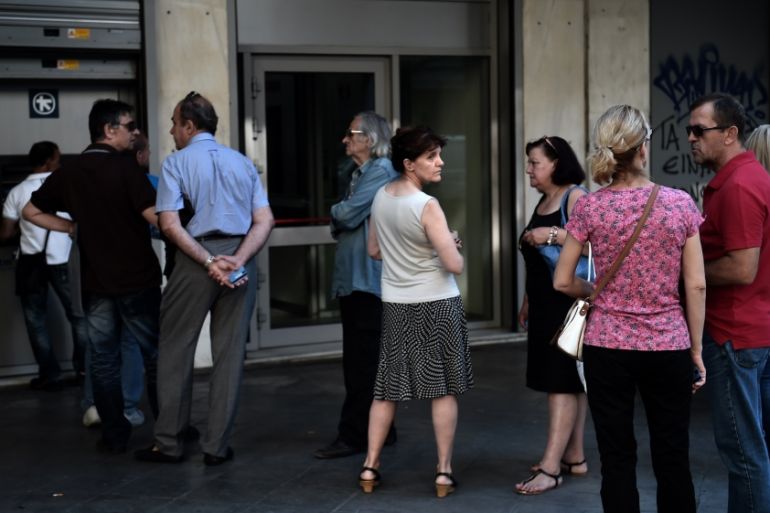Greek banks running out of cash as EU leaders meet
Cash reserves start to run dry as ECB tightens controls and Greek PM Tsipras meets with EU creditors.

Greece’s banks are fast running out of cash, as Prime Minister Alexis Tsipras takes his latest bailout proposal to the country’s eurozone creditors, days after Greek voters overwhelmingly rejected Europe’s latest bailout offer.
As leaders of the European Union gathered in Brussels on Tuesday, strong words have been directed against Athens, with Latvia’s Central Bank governor Ilmars Rimsevics saying Greece has voted itself out of the eurozone after Sunday’s referendum.
Keep reading
list of 4 itemsByteDance prefers TikTok shutdown in US over sale: Report
‘We need you’: Solomon Islands’ support for US agency’s return revealed
Why are nations racing to buy weapons?
Meanwhile, Wolfgang Schaeuble, Germany’s finance minister, repeated that Berlin opposes an overall cut in Greek debt.
More on this story: Greeks voice their hopes and fears on referendum result
European and Greek officials have also been engaged in a dispute on whether or not Athens has presented a new proposal for a bailout.
A eurozone official told the Reuters news agency that no formal proposal for credit had been submitted as of Tuesday, adding: “If they really plan to present something formal tomorrow, they may not find anyone to read it.”
Asked about those comments, one Greek government official responded: “Is it really that we don’t have proposals or is it that they don’t like our proposals?”
Tuesday’s meetings have been billed as a last chance for Greece to stay in the single currency bloc. The country’s banks remain closed and are down to their last reserves of cash.
Al Jazeera’s Jacky Rowland, reporting from Brussels, quoted European officials as saying that the latest talks are “the end of the road” for Greece.
Officials on Monday announced that the banks would remain closed until Thursday, as the European Central Bank (ECB) slowly tightened a noose on its funding to Greece.
The daily withdrawal limits were to remain unchanged at 60 euros ($66) per account daily.
|
|
Al Jazeera’s John Psaropoulos, reporting from Athens, said Greek banks were now operating “under siege”, with one major Athens bank only able to keep its ATMs open on Monday after two major companies deposited their payrolls in cash.
“The banks are living day-to-day and hand-to-mouth,” Psaropoulos said.
“They believe they have enough to keep going until Wednesday, possibly Thursday, but only under the capital controls (withdrawal limits).”
The ECB has maintained its emergency liquidity lifeline for Greek banks, however it raised charges on collateral the banks require to present for funds, effectively devaluing the banks’ assets and making them less able to borrow against their collateral.
RELATED: Syriza’s lies and empty promises
“The situation is becoming financially worse, not just more politically difficult,” our correspondent said.
Greece last week defaulted on a $1.8bn repayment to the International Monetary Fund, and on Sunday, in a referendum, the Greek people voted to say “no” to Europe’s bailout deal.
Rapid negotiations
Tsipras on Tuesday must persuade Europe’s other 18 leaders, many of whom are exasperated after five years of the Greek crisis, to open rapid negotiations for a major new loan to rescue his country.
He spoke to German Chancellor Angela Merkel regarding the new proposals ahead of Tuesday’s hastily arranged emergency summit of the eurozone countries in Brussels.
|
|
Germany and France, whose economies together account for nearly half of the eurozone, on Monday asked Greece to make detailed proposals to revive bailout talks, a day after the referendum that decisively rejected creditors’ demands for further austerity.
Late on Monday, a Greek government source said that Tsipras had spoken to ECB chief Mario Draghi in efforts to reopen banks with assistance from the Frankfurt-based lender.
Tsipras also spoke to IMF chief Christine Lagarde “on the need to find a viable solution dealing with the real problems of the Greek economy”, the source said.
Lagarde said the IMF was “ready to assist Greece if requested to do so”, despite the June 30 default.
RELATED: Crowdfund for Greek bailout edges to 2 million euros
European Commission head Jean-Claude Juncker said on Tuesday that while he did not want Greece to leave the eurozone, in a so-called Grexit, the Greek people had voted on a deal that “no longer existed”.
“We have to put a very large ego away and deal with the situation we face,” Juncker said.
Tsipras insists that instead of a Grexit, Greece’s creditors will now finally have to talk about restructuring the country’s massive 240 billion euro ($267bn) debt to them.